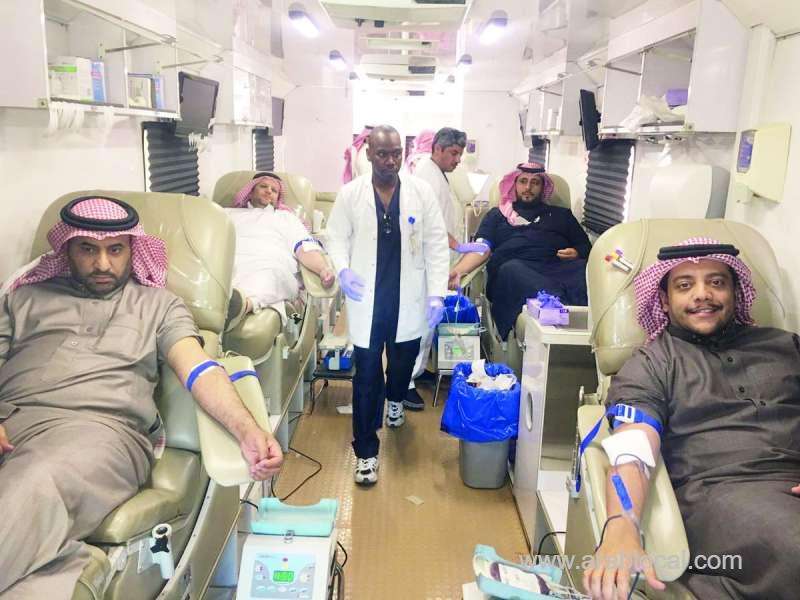Saudis Are Being Supposed To Give Blood As The Pandemic Spreads Throughout The World
Category:
MEDICAL
• According to a survey, lockdowns, disinformation, and a lack of awareness have worsened the demand-supply mismatch.
• Healthy Saudis are being urged to give blood to help reload stocks depleted by epidemic restrictions
COVID-19 has pushed health systems throughout the world to their breaking point, resulting in overcrowding in hospitals, delays in medical procedures, and physicians and nurses becoming fatigued and overworked.
The decrease of blood reserves necessary for life-saving transfusions, usage during operations, and treatment of medical diseases such as anemia, cancer, and blood disorders has been a secondary effect of the global health crises.
Many individuals have been banned from donating blood due to lockdown measures and stringent limitations on visiting hospitals. COVID-19 infections and the risk of infection have kept a large number of potential donors at home, even after the limitations were removed.
Faced with the subsequent shortages, Saudi Arabia's health officials are eager to increase the Kingdom's blood stock levels, which must be replaced on a regular basis to fulfill demand.
"The need for blood has skyrocketed. As a result of the epidemic, the situation has gotten worse all across the world. Dr. Maha Badawi, a hematology expert and head of blood transfusion services at King Abdulaziz University Hospital in Jeddah, told Arab News that the call is never-ending.
"COVID-19 had a serious effect on the worldwide blood supply, and the problem was caused by a number of variables. Despite the fact that COVID-19 is not transmitted through the blood, COVID-19-positive patients and those who were exposed to positive cases were necessary to isolate for a length of time to prevent the virus from spreading.
"The social-distancing measures had an influence as well. Mass campaigns and projects were halted, resulting in a reduction in the number of donors."
As a result, Saudi Arabia today has a type O shortfall in red blood cell inventories and a type AB shortage in plasma stores.
During the outbreak, donations to blood banks fell by 39.5 percent, according to a retrospective research conducted by King Abdullah Hospital in Bisha. Blood demand fell by 21.7 percent within the same time period, owing to the several procedures that had to be postponed.
A research done in the medical journal Transfusion and Apheresis Science in 2021 titled Awareness about Coronavirus and Challenges for Blood Services among Potential Blood Donors used survey data from a cross-section of the Saudi population to assess the factors that had prevented people from donating blood.
It was shown that social distancing measures, misunderstanding about how the illness is spread, and a lack of education among potential blood donors may have all contributed to the high rate of missed or postponed donations.
The majority of those respondents expressed fear about the virus spreading during the blood donation process. Others were concerned about interacting with other contributors.
To safeguard donors and hospital personnel, the study's authors recommended that health authorities improve donor education, encourage at-risk donors to postpone contributions, enable physical-distance measurements, and mandate the use of personal protective equipment.
In response to these fears, the Kingdom has developed initiatives to reassure the people and urge them to give blood.
"The need is constant, and each hospital blood bank requires a constant flow to maintain its daily stock, depending on the demands of the hospital," Badawi explained.
"The availability of given blood components varies according to the lifespan of donated blood components. Some components can be preserved for a month or two, while others can only be stored for five days at most, so you're always in need of donors."
Platelets can only be preserved for seven days, although red blood cells may be kept for up to 35 days. Plasma can be kept for up to three years in the freezer.
Patients with sickle cell disease, a set of genetic red blood cell diseases, require frequent blood transfusions for a variety of reasons. As they deliver oxygen throughout the body, healthy red blood cells are spherical and travel easily through narrow blood arteries. The red blood cells of a patient with SCD are hard and sticky, forming a crescent or "sickle" shape.
Because sickle cells kill much faster than conventional red blood cells, there is always a scarcity of red blood cells. Furthermore, when they move through small blood arteries, they may become caught and restrict blood flow, causing discomfort and major medical issues.
06 Feb, 2022
0
522






